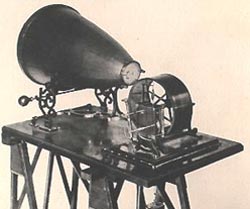Oldest Recorded Voices Predate Edison by Seventeen Years
 Seventeen years before Thomas Edison, Edouard-Leon Scott de Martinville recorded the first human voice. Unfortunately, he had no way to play it back.
Seventeen years before Thomas Edison, Edouard-Leon Scott de Martinville recorded the first human voice. Unfortunately, he had no way to play it back.
The device etched representations of sound waves into paper covered in soot from a burning oil lamp.
Lines were scratched into the soot by a needle moved by a diaphragm that responded to sound. The recordings were never intended to be played.
It was retrieved from Paris by Mr Giovanni, working with First Sounds, a group of audio historians, recording engineers and sound archivists who aim to make mankind’s earliest sound recordings available to all.
To retrieve the sounds scientists at the Lawrence Berkeley National Laboratory (LBNL) in California made very high-resolution digital scans of the paper and used a “virtual stylus” to read the scrawls.
However, because the phonautograph recordings were made using a hand-cranked device, the speed varied throughout, changing the pitch.
All of this brings to mind patent and copyright. Edison held the patent for audio recordings, yet Edouard-Leon Scott beat him to the process by seventeen years. Since Scott was unable to reproduce the sound and only made a visual representation of it, I can understand why Edison’s machine was better, but in today’s environment of patent law, I could envision Scott suing Edison over this.
Via: Shiny Shiny: Oldest recorded human voice finally played back; Radio 4 newsreader amused